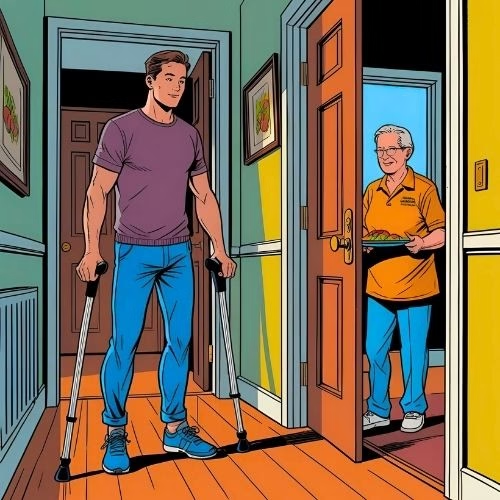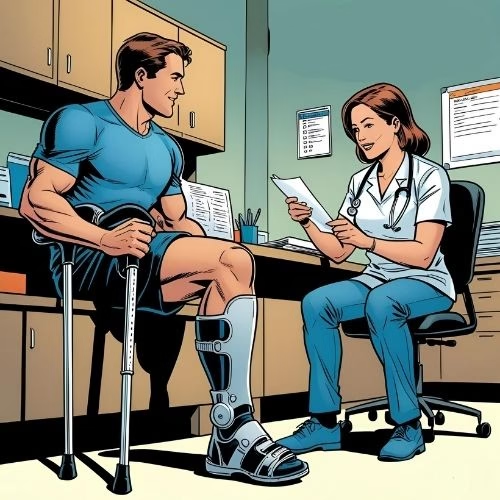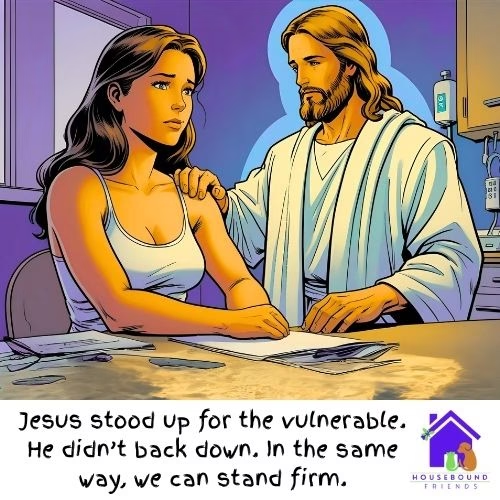✨ Introduction: When Speaking Up Feels Impossible
When you’re housebound and vulnerable, even asking for help can feel overwhelming. You’re already tired, managing symptoms, and trying to stay afloat. Fighting for better care might seem impossible — especially when no one’s listening. That’s where advocacy support comes in. It gives you a way to be heard, even when you can’t do all the talking yourself.
In our recent post on Disability Rights, we looked at how many people fall through the cracks. This post builds on that, offering practical steps to help you get the care and respect you deserve.
Whether you’re thinking about speaking up or looking for someone to stand beside you, this guide is here to help.
🛑 What Makes Someone ‘Vulnerable’ in the Eyes of the System?
The word ‘vulnerable’ is used frequently, but rarely in a way that accurately reflects real-life experience. In most official settings, a vulnerable adult is defined as someone who is at risk of harm or exploitation due to illness, disability, or other limitations. It sounds clear on paper. However, in practice, the people most in need of protection are often the least likely to receive it.

Housebound individuals are a prime example. You may be severely unwell, utterly reliant on others, and unable to access basic services. Yet, you can still be overlooked because you’re out of sight. Many of us are left to navigate complex care systems alone. Oftentimes, we have to do this with no support, no visitors, and no one to speak up when things go wrong.
Additionally, there’s a pattern of mislabelling vulnerable patients. For instance, if you’re too ill to attend appointments or push back against poor treatment, you’re often marked as non-compliant. If you question a diagnosis, you might be dismissed as anxious or difficult. This is what medical gaslighting looks like. It’s not always loud or cruel. But it’s deceptive enough to cause harm in the dark, where truth is hidden and no one’s held to account.
I hate being labelled “vulnerable.” Really, the word vulnerable only applies because these systems are predatory. Without exploitation, we wouldn’t be at risk. Actually, we’d just be people who need rest, care, or time to heal.
🤝 What Is Advocacy Support and How Can It Help?
Advocacy support is about having someone in your corner — when you’ve run out of strength, options, or patience. It means another human being, not a chatbot or a checklist, standing beside you and saying, ‘I hear you. I see you. I’m not letting this get buried.’
Let’s break that down, because the word “advocacy” gets flung around like confetti. Frankly, when you’re housebound, it either saves your sanity or makes things worse.
📣 Formal advocacy

Formal advocates are professionals or services trained to represent you. They’re often from charities, NHS support teams, or legal groups. This means an independent person or service steps in to speak on your behalf. Frankly, this is crucial if you’re being mistreated, ignored, or overwhelmed by red tape. Advocates should help you write letters, attend meetings with you, or challenge decisions. And do this without turning it into a PowerPoint seminar about how resilient you should be.
But not all advocacy services are equal. Some are brilliant. Meanwhile, others are just… polite admin. If they’re dumping forms on you instead of listening, that’s not advocacy. Actually, that’s homework. And that’s not helpful when you’re still figuring out whether you’ve even eaten today.
💛 Informal advocacy
This is someone you trust — a friend, a relative, a neighbour — who says, “I’ve got you.” Not with platitudes, but with action. Maybe they read your emails when your brain fog is too heavy. Perhaps they call that GP you’ve been too anxious to deal with. Alternatively, they just sit quietly next to you and say, “It’s alright. I know you’re not mad. No, you’re not exaggerating. You’re being ignored, and I’m not letting that continue.”
In a healthy society, we’d have more of this. Real support for one another. Instead of a forced DIY life template where everyone is “independent” and lonely. Frankly, that’s not community. That’s abandonment dressed as empowerment.
✋ “self-advocacy”
Then, there’s what the system likes to call “self-advocacy.” But let’s stop right there. Because this phrase, while dressed up as empowering, is often a cover for something more sinister.
In truth, self-advocacy has become the system’s way of shirking responsibility. Instead of offering proper support, it hands you a badge for “trying really hard”. Even if you’re flat on the floor. It praises you for doing the work it should be doing. After, the system uses that same effort as an excuse to deny help.
🧑Self-advocacy is good—until it’s the only way to stay safe. When not self-managing is treated as non-compliance, it stops being empowering. #MedicalGaslighting #DisabilityJustice #AdvocacySupport
And that’s the real danger. Sick people shouldn’t have to fight just to be heard. Surely, the whole point of advocacy is that someone else steps in when you’re no longer able. Anything less is not support. Frankly, it’s abandonment with a smile.
📋 When to Seek Advocacy Support
Signs You’re Not Getting the Care You Deserve
Sometimes, the signs you need help are subtle. Whilst at other times, they’re screaming in your face. But when you’re exhausted, overwhelmed, or stuck in survival mode, it’s easy to miss them. Even obvious red flags can be brushed aside with excuses like, “Maybe I’m overreacting,” or “They’re just busy today.”
Common Red Flags That You’re Being Overlooked or Harmed
Here are some signs you’re not being treated fairly — or safely:
- You’re being rushed, ignored, or constantly talked over.
- Professionals blame you for your condition, choices, or lack of improvement.
- You’re being misdiagnosed.*
- You’re being given a label that merely describes your symptoms — often in confusing medical jargon — instead of having the underlying cause identified and treated.*
- Your care is denied, delayed, or downgraded without a clear explanation.
- You feel afraid to speak up, or worse, you’ve given up trying.
*Medical labels often sound fancy, but they don’t always mean real answers. Too often, doctors describe symptoms without uncovering the root cause, leaving you with a name but no solution.
Understanding the Pattern: Neglect and Gaslighting
These are patterns of neglect and gaslighting that erode your health and sense of reality. If something feels off, it probably is. You don’t need proof to trust your instincts.
The Harsh Reality: When Systems Cause Harm
But here’s a truth that’s hard to hear: some systems don’t just fail us — they actively harm us. When vulnerable people are denied essential care, housing, or support, it can cross into what experts call democide or genocide. Really, a systematic destruction through neglect. This isn’t just bureaucratic failure. It’s a deliberate, cold cruelty wrapped in paperwork and silence.
This reality is terrifying, especially if you have little or no family support. Indeed, when the system turns against you, it can feel like the rug is being pulled out from under you. Ultimately, leaving you utterly exposed.
Finding Strength Through Advocacy Support
But here’s where hope lives: knowledge is power. Understanding these dangers helps you recognise the traps before you fall into them. And that’s why advocacy is crucial. Having someone who knows the system and fights alongside you can make all the difference.
Know that you are not powerless. Even when the system seems stacked against you. Truly, there are ways to push back, protect yourself, and find allies who genuinely care about you. Lean on your community, your faith, or whoever stands by you. Frankly, standing up is an act of courage and a seed of change.
🛐 Holding the Line: Advocacy Support as a Spiritual Act

In the face of neglect and injustice, advocacy is more than just a practical tool; it is a vital means of empowerment. Moreover, it’s a spiritual act of resistance. Jesus Himself stood up for the vulnerable, the overlooked, and the hurting. Even in His most profound suffering, He didn’t back down. In the same way, we can stand firm, speaking the truth and seeking justice. No matter how difficult it may feel.
When we challenge and push back against systems that harm us, it isn’t just about survival. Additionally, it’s a form of resisting evil. Truly, it is standing on the side of what is right. Even when the world tries to silence us. This kind of courage reflects the strength that faith can inspire within us.
Remember: you are not invisible to God, even if you’re invisible to the system. Your pain, your fight, and your voice matter deeply in His eyes. Although holding the line may be hard, you are never alone. Indeed, He stands with you, giving you strength when you feel weak.
🎯 You Deserve Real Care and Help Getting It
Advocacy support isn’t just about paperwork or appointments. More, it’s about someone standing beside you when the system feels overwhelming, confusing, or even hostile. After all, you deserve care that respects your dignity and your needs.
Taking that first step doesn’t have to be huge. It could be as simple as saving a phone number for a contact or advocate. Maybe it’s sharing your concerns with a trusted friend. Just jotting down your experiences to help make sense of them. Even small actions build the foundation for bigger change. Why not check the next section for details of advocacy support services? It may be the best single task you achieve today.
Unquestionably, your story matters. If you’ve faced challenges seeking care or advocacy support, please share your experience. This blog is here to help you navigate the journey. One step at a time.
Ultimately, you’re not alone. So, you don’t have to face this fight by yourself.
📞 Where to Find Advocacy Support
Advocacy can be the missing link between you and the care you need. Whether you’re housebound, disabled, or medically gaslit, these organisations may be able to help. Some offer direct assistance; others may guide you to the right person.
Please note that some services are free, while others may require referrals or a formal application process.
🇬🇧 United Kingdom
- POhWER – Free advocacy support for health and social care (NHS complaints, mental health, and more).
- VoiceAbility – Independent statutory advocacy including IMHA and Care Act support.
- The Advocacy People – Available across southern England, free support.
- Disability Rights UK – Guides, factsheets, and helpline info.
🇮🇪 Ireland
- National Advocacy Service for People with Disabilities (NAS) – Free, independent advocacy.
- Patient Advocacy Service – Helps with complaints about Irish public hospitals and HSE services.
- Sage Advocacy – Older people and vulnerable adults.
🇺🇸 United States
- National Disability Rights Network (NDRN) – Find your state’s protection and advocacy agency.
- Center for Disability Rights – Advocacy, peer support, and independent living resources.
- Patient Advocate Foundation – Case management and support with complex medical needs (some services income-based).
🇨🇦 Canada
- ARCH Disability Law Centre (Ontario) – Free legal advocacy for disability rights.
- DisAbled Women’s Network Canada (DAWN) – Intersectional advocacy.
- Community Advocates Network (varies by province) – Try local health advocacy offices or ombudsman services.
🇦🇺 Australia
- Disability Advocacy Finder (Australian Government) – Search for services near you.
- Health Consumers NSW – Advocacy and support navigating the health system.
- People With Disability Australia (PWDA) – National systemic and individual advocacy.
🇳🇿 New Zealand
- Health and Disability Advocacy Service (Free) – Independent support for anyone using health/disability services.
- CCS Disability Action – Local advocacy and support services.
- Disabled Persons Assembly NZ – Systemic advocacy for the rights of disabled people.
💬 Want to dive deeper into your rights? Don’t miss our companion piece: Understanding Disability Rights When You’re Housebound. It’s packed with empowering info.




